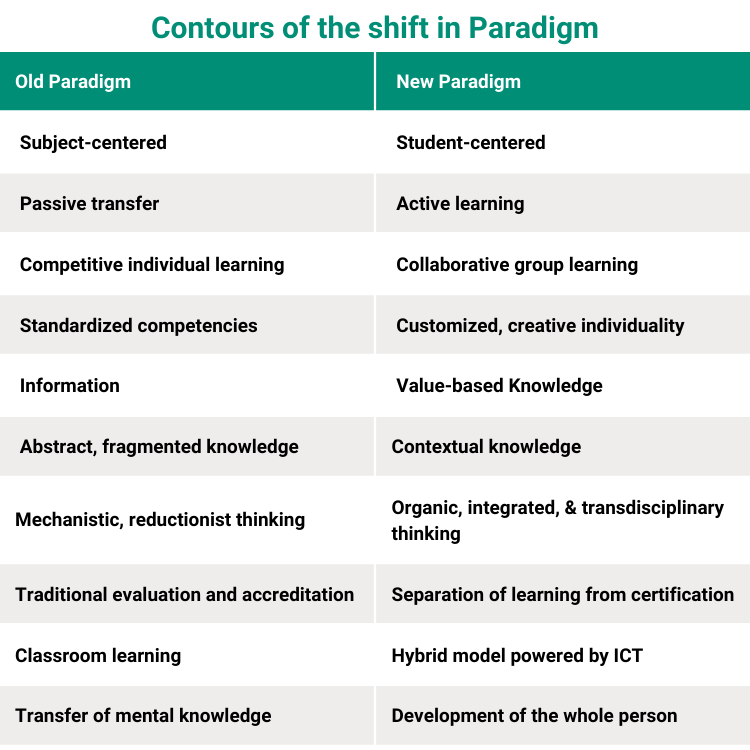Education is an essential instrument and catalyst for social transformation. WAAS has long recognized the urgent need for thinking beyond existing models of education to complement and enhance the social impact, reach, accessibility, quality and affordability of education globally. Systemic change is needed in every aspect of education—including knowledge delivery systems, evaluation, accreditation, content, pedagogy, and teacher training. Education is a remarkable organization that transmits the essence of humanity’s cumulative past learning to future generations in a systematic and condensed form. But the world faces enormous quantitative and qualitative gaps in education today that cannot be met by the existing system and models of education.
“If you were tasked with creating an accessible, affordable, relevant world-class system of higher education open to all, how would you do it?“
WAAS has undertaken an in-depth multi-year study to identify strategies to foster emergence of a global delivery system based on a new paradigm in education that bridges the quantitative and qualitative gaps in the current system, integrates fragmented disciplines, realigns abstract theory with the complexity of the real world, and is founded on a pedagogy that shifts the focus from standardized, mass production to customized, individualized learning designed to foster person-centered, value-based, independent thinking, and creativity.

WAAS, in collaboration with the World University Consortium, has conducted 6 international conferences and dozens of roundtable symposiums in addition to numerous articles and reports identifying key elements of the paradigm shift needed in delivery system, pedagogy and content which will be far more relevant in preparing youth for the world which is emerging and far more effective in generating the values, thinking, and innovative solutions needed to address our pressing global challenges, implement the UN SDGs and promote greater human security for all.
World University Consortium
The World University Consortium was established in 2013 by the World Academy in association with eminent international institutions. The mission of the Consortium is to evolve and promote development of accessible, affordable, quality higher education worldwide based on a human-centered approach that shifts the emphasis from specialized expertise to contextualized knowledge within a trans-disciplinary conceptual framework reflecting the complexity and integration of the real world.
At the time it was established in 1960, the World Academy founders conceived the idea of establishing a World University and took steps to set it in motion by developing a mission statement, developing a management structure and Executive Committee, and establishing an initial set of operational centers in leading educational and research institutes in several countries. The World University Consortium is an initiative inspired by the original vision of the Academy’s founders and recast to in the light of current global challenges and emerging opportunities.
Featured Events
6th Intl Conference on Education for Human Security
March 7-9, 2023, Online
This conference examined the relevance and applicability of the human security approach to different fields of higher education. It was conducted in support of HS4A campaign, an initiative of the UN Trust Fund for Human Security and the World Academy of Art and Science in support of the United Nations’ commitment to Human Security.
5th Intl Conference on Future Education
Dec 6-8, 2021, Online
The Conference aimed to mobilize the potentials of higher education as an essential foundation and catalyst for addressing global challenges. It called for radical measures to disrupt and transform the current system and embrace innovative strategies to ensure effective multilateralism and sustainable human security for all.
4th Intl Conference on Future Education
Nov 11–13, 2019, Belgrade
The conference examined effective policies and pedagogies to accelerate a paradigm change in education. It explored ways to overcome disciplinary barriers to provide integrated knowledge, methods to shift the focus from subject to students, and ways to promote capacities for creative thinking, personality and individuality.
Future Education: Latin American Perspectives
Nov 12-14, 2018, Rio de Janeiro
The challenges we face today necessitate radical transformation in our way of thinking and acting. Such a transformation is only possible when it begins with the way we educate our youth. The Conference brought together leading educators and leaders to showcase innovative approaches and success stories in education around the world.
2nd Intl Conference on Future Education
Nov 16-18, 2017, Rome
The Conference recognized the need for a paradigm shift in the way we teach and learn in order to meet the challenges confronting global society. It identified practical measures to meet the needs and aspirations of all stakeholders — students, teachers, employers, workers, research institutions, governments and civil society.










